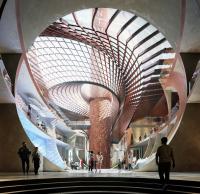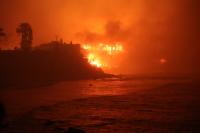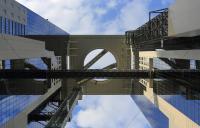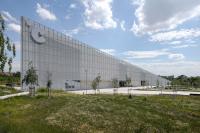Lever House Office
New York, USA
We renovated the 18th and 19th Floors in the Lever House building on Park Avenue in New York City for a financial services company. The owner of the company is an art collector and design enthusiast. He leased floors in the lever house because he admired the building, having studied and written a paper about it as an undergraduate student.
The low floor to floor heights limit the ceiling height to about nine feet. The low horizontality of the space is accentuated by the continuous ribbon of windows; this creates a horizontal band of natural light that wraps the entire floor the. These windows also expose the verticality of the exterior cityscape in a 360 degree view. This very simple relationship between interior horizontality and exterior verticality became the conceptual starting point for the design.
Using a reflective membrane ceiling along the perimeter we created a virtual doubling of the exterior window. The perception is of a much taller space along the perimeter of the entire floor. The reflections also bring the verticality of the exterior view into the interior finish surfaces.
The lever house is an icon of modernist design. The grid of the façade and clear orthogonal structure and massing are the defining characteristics of the existing building. We designed the space to work with and reinforce this order. Starting with the building’s grid, we created a rational orthogonal layout for the offices and other spaces. As a counterpoint to this extension of the buildings inherent Cartesian logic, we introduced some subtle non-orthogonal geometries. These elements are framed by the orthogonal geometry. The most striking of these are the staircase connecting the two floors and the translucent ceiling over the open trading areas in the center of the office.
The center trading floor area is illuminated using a backlit translucent membrane ceiling. The lack of discrete fixtures or any type of grid in this area helps create a depthless zone of light. The membrane is lowered in the center of the trading area to accommodate air conditioning grills and sprinklers. Lowering parts of this membrane in this area and at one side of the entry creates a subtly sculpted ceiling surface that does not conform to the strong vertical and horizontal datum of the existing context.
Glass enclosures for the private offices insure that the entire space is seen together. The low iron glass partitions perpendicular to the curtain wall fade from clear to a white opaque finish providing privacy between offices and creating visual “mist” from desk height to the floor.
At the entry we created an opening in the existing floor connecting the reception area to the floor above. A double height wall finished in black plaster that has been polished to a shine creates a strong vertical anchor connecting the two levels. This black surface meets a glossy black ceiling. Reflected in the ceiling, the wall appears to extend twice as high. Simultaneously, the ceiling is reflected in the glossy plaster wall, doubling the perceived horizontal depth of the ceiling. This juncture of two glossy surfaces, one horizontal and one vertical, and their reflections creates a three dimensional intersection of vertical and horizontal planes.
Behind this black vertical surface is a sculpted, carved out stairway that provides a sense of ceremony as visitors move from the reception area to the main conference room on the next floor. The interior surface of this stair is finished in a pearlescent plaster. The surface reflects glints of pink and blue depending on the angle of view and incidence of light. The curved non-Cartesian geometry is a counterpoint to the Cartesian order of the building and the city beyond; a depthless interior transition between the two floors.
- Architects
- Slade Architecture
- Location
- 390 Park Avenue, 10022 New York, USA
- Year
- 2006











